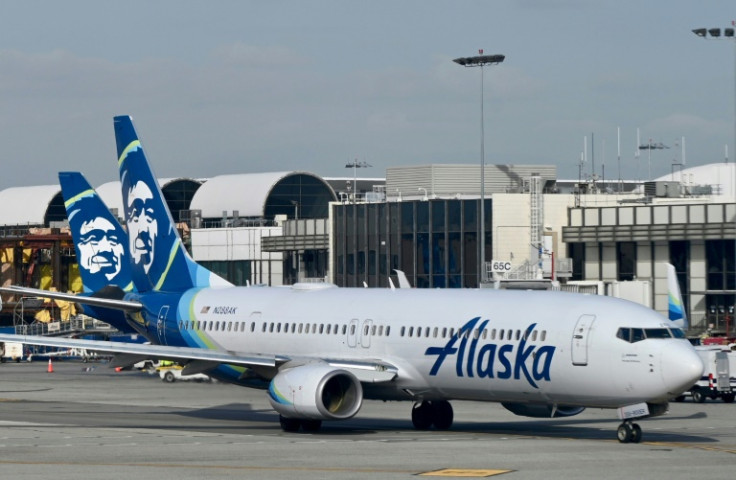Boeing Hit By New Headwinds In Recent Mid-flight Scare

A mid-air emergency in which a piece of fuselage came off a Boeing 737 MAX 9 jetliner as it flew over the US west coast dealt a new blow to the oft-beleaguered manufacturer.
However, the consequences for Boeing are expected to be limited.
On Saturday the Federal Aviation Administration ordered the grounding of 171 planes of that model so they can be inspected.
That order came after a scary incident Friday in which a 737 MAX 9 operated by Alaska Airlines and carrying 177 people had to make an emergency landing because a sealed-over door panel ripped off during a flight from Portland, Oregon to Ontario in southern California.
Spectacular video images of the incident, which showed a gaping hole in the side of the plane, air rushing through the cabin, oxygen masks dangling and travelers observing city lights below them through the opening, were seen around the world. No one was seriously injured, however.
An investigation by the National Transportation Safety Board has just begun and it is not yet clear what went wrong on that flight, in which a mid-cabin door plug -- a cover panel used to fill an unneeded emergency exit in planes with smaller seat configurations -- came off during flight.
But it is the latest in a series of setbacks in recent years for Boeing.
The worst were two crashes of 737 MAX planes, in October 2018 and March 2019, that caused the deaths of 346 people in total.
These accidents linked to software in a flight stabilizing system called the MCAS triggered the grounding of all 737 MAX planes for nearly two years.
But Boeing had other woes, too, as it suspended delivery, several times over the course of two years, of its long-haul 787 because of manufacturing and inspection flaws.
More recently it was the 737 MAX that again drew bad press. Last autumn defects were found in the plane's rear bulkhead, which is a kind of partition. And in December a risk of bolts coming loose in the navigating system was found.
The latest mishap could stem from the manufacturing of the door plug that came loose or bolts that were supposed to secure it, or from a quality control issue, said Scott Hamilton of the specialized aviation news outlet Leeham News.
"If it's indeed a quality assurance issue, whether it's in Spirit or at Boeing, I would say it's more than likely a narrow, quality assurance issue," he said, referring to Spirit Aerosystems, Boeing's main subcontractor.
"I think this is more of a one-off anomaly than I would a systemic issue," he said.
"For me it is a very isolated problem," added Michel Merluzeau, an aeronautics specialist with consulting firm AIR. "I do not at all think it is a design problem."
He said evidence for this is the fact that the FAA ordered inspections that take just four to eight hours.
"We should be back to normal in about a week," said Merluzeau.
He said this latest incident stems from supply chain and production problems that are currently affecting the commercial aviation sector, and also cited the impact of the coronavirus pandemic.
For instance in the spring of 2020, as the pandemic raged and the US economy largely went into lockdown, Boeing stopped making planes for nearly a month.
As air travel fell off dramatically, Boeing laid off around 30,000 workers.
Boeing started hiring en masse again in 2022 but many experienced workers did not return to the company.
"You now have new people that have been hired, that have to go through what's called a learning curve," said Hamilton.
Merluzeau said "experience is something that is very important in this industry."
Unlike Boeing, its big competitor Airbus only shut down for a few days in 2020 and avoided mass layoffs, said Hamilton.
Merluzeau said he did not see this latest incident having long term commercial impact on Boeing.
"Boeing must handle the situation and as soon as possible provide guarantees to customers on the manufacturing of its planes so that people do not worry," he said.
Hamilton said "the Max 9 is, for the most part a US airplane," with two thirds of the fleet operated by Alaska Airlines (65) and United (79).
"And their relationship with Boeing is pretty deep and pretty good," said Hamilton, who thinks the blown door problem on Friday will mainly affect Boeing's dealings with US regulators.
Boeing recently requested a safety exemption in the 737 MAX 7's certification process. The exemption would cover the engine anti-ice system, on which a defect has been identified.
Hamilton said that if the probe of this mishap ends up pointing the finger at Boeing "it's going to impact the FAA decision whether to grant an exemption."
© Copyright AFP 2024. All rights reserved.





















